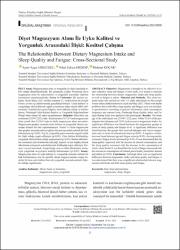| dc.contributor.author | Adıgüzel, Aysel Ayça | |
| dc.contributor.author | Erdem, Nihal Zekiye | |
| dc.contributor.author | Koçak, Mehmet | |
| dc.date.accessioned | 2023-06-08T11:42:37Z | |
| dc.date.available | 2023-06-08T11:42:37Z | |
| dc.date.issued | 2023 | en_US |
| dc.identifier.citation | Adıgüzel, A. A., Erdem, N. Z. ve Koçak, M. (2023). Diyet magnezyum alımı ile uyku kalitesi ve yorgunluk arasındaki ilişki: Kesitsel çalışma. Türkiye Klinikleri Sağlık Bilimleri Dergisi, 8(1), 30-40. https://doi.org/10.5336/healthsci.2022-92606 | en_US |
| dc.identifier.issn | 2536-4391 | |
| dc.identifier.uri | https://doi.org/10.5336/healthsci.2022-92606 | |
| dc.identifier.uri | https://hdl.handle.net/20.500.12511/11049 | |
| dc.description.abstract | Amaç: Magnezyumun uyku ve yorgunluk ile ilgili konularda et- kili olduğu düşünülmektedir. Bu çalışmada, erişkin bireylerde diyet magnezyum alımı ile uyku kalitesi ve yorgunluk arasındaki ilişkinin incelenmesi amaçlanmaktadır. Gereç ve Yöntemler: Bu kesitsel ça- lışma, Nisan-Mayıs 2021 tarihleri arasında 211 erişkin birey ile Google Forms çevrim içi platformunda gerçekleştirilmiştir. Uyku kalitesi ve yorgunluğu etkileyebilecek sağlık sorunlarına sahip olanlar dâhil edil- memiştir. Katılımcılara genel bilgiler, besin tüketim sıklığı ve miktarı formu, Pittsburgh Uyku Kalitesi İndeksi ve Yorgunluk Değerlendirme Ölçeği’nden oluşan bir anket uygulanmıştır. Bulgular: Bireylerin yaş ortalaması 25,99±7,252 yıldır. Katılımcıların %71,6’sında magnezyum alımı yeterli iken %25,6’sında ise fazla magnezyum alımı mevcuttur. Magnezyum grupları arasında uyku kalitesi ve yorgunluk düzeyi açı- sından anlamlı bir fark saptanmamıştır. Yeterli ve fazla magnezyum alan gruplar arasında yalnızca eğitim durumu açısından anlamlı bir fark bulunmuştur (p<0,05). Yaş ile yorgunluk puanı arasında negatif yönde bir ilişki olduğu tespit edilmiştir (p<0,05). Uyku kalitesi kötüleştikçe yorgunluk düzeylerinin arttığı saptanmıştır (p<0,05). Badem tüketimi- nin artmasıyla uyku kalitesinin iyileştiği, kepekli ve tam buğday ekmek tüketiminin artmasıyla uyku kalitesinin kötüleştiği tespit edilmiştir. Kır- mızı ve yeşil mercimek, Antep fıstığı, muz ve tahin tüketiminin artma- sıyla yorgunluk seviyesinin azaldığı bulunmuştur (p<0,05). Sonuç: Magnezyum alımı ile uyku kalitesi ve yorgunluk arasında anlamlı bir fark bulunamamış olsa da spesifik olarak magnezyumdan zengin be- sinler ile hem uyku kalitesi hem de yorgunluk arasında anlamlı ilişki- ler olduğu saptanmıştır. | en_US |
| dc.description.abstract | ABSTRACT Objective: Magnesium is thought to be effective in issues related to sleep and fatigue. In this study, it is aimed to examine the relationship between dietary magnesium intake and sleep quality as well as fatigue in adults. Material and Methods: This cross-sectional study was carried out with 211 adult individuals on the Google Forms online platform between April and May 2021. Those with health problems that could affect sleep quality and fatigue were not included. A questionnaire consisting of general information, food consumption frequency and amount form, Pittsburgh Sleep Quality Index and Fatigue Rating Scale was applied to the participants. Results: The mean age of the individuals was 25.99±7.252 years. While 71.6% of the participants had adequate and 25.6% had excessive magnesium intake. No significant difference was found between the magnesium groups in terms of sleep quality and fatigue level. A significant difference was found between the groups that received adequate and excess magnesium only in terms of educational status (p<0.05). A negative correlation was found between age and fatigue score (p<0.05). As sleep quality worsened, fatigue levels increased (p<0.05). It was determined that the sleep quality improved with the increase in almond consumption, and the sleep quality worsened with the increase in the consumption of whole wheat bread. It was found that the level of fatigue decreased with the increase in consumption of red and green lentils, pistachios, banana and tahini (p<0.05). Conclusion: Although there was no significant difference between magnesium intake and sleep quality and fatigue, it was determined that there was a significant relationship between magnesium-rich foods and both sleep quality and fatigue. | en_US |
| dc.language.iso | tur | en_US |
| dc.publisher | Türkiye Klinikleri Yayınevi | en_US |
| dc.rights | info:eu-repo/semantics/openAccess | en_US |
| dc.subject | Diyet | en_US |
| dc.subject | Besin ve Beslenme | en_US |
| dc.subject | Magnezyum | en_US |
| dc.subject | Uyku | en_US |
| dc.subject | Yorgunluk | en_US |
| dc.subject | Diet | en_US |
| dc.subject | Food and Nutrition | en_US |
| dc.subject | Magnesium | en_US |
| dc.subject | Sleep | en_US |
| dc.subject | Fatigue | en_US |
| dc.title | Diyet magnezyum alımı ile uyku kalitesi ve yorgunluk arasındaki ilişki: Kesitsel çalışma | en_US |
| dc.title.alternative | The relationship between dietary magnesium intake and sleep quality and fatigue: Cross-sectional study | en_US |
| dc.type | article | en_US |
| dc.relation.ispartof | Türkiye Klinikleri Sağlık Bilimleri Dergisi | en_US |
| dc.department | İstanbul Medipol Üniversitesi, Sağlık Bilimleri Yüksekokulu, Beslenme ve Diyetetik Bölümü | en_US |
| dc.department | İstanbul Medipol Üniversitesi, Tıp Fakültesi, Temel Tıp Bilimleri Bölümü, Biyoistatistik ve Tıp Bilişimi Ana Bilim Dalı | en_US |
| dc.authorid | 0000-0001-5659-7561 | en_US |
| dc.authorid | 0000-0001-7046-9515 | en_US |
| dc.authorid | 0000-0002-3386-1734 | en_US |
| dc.identifier.volume | 8 | en_US |
| dc.identifier.issue | 1 | en_US |
| dc.identifier.startpage | 30 | en_US |
| dc.identifier.endpage | 40 | en_US |
| dc.relation.publicationcategory | Makale - Ulusal Hakemli Dergi - Kurum Öğretim Elemanı | en_US |
| dc.identifier.doi | 10.5336/healthsci.2022-92606 | en_US |
| dc.institutionauthor | Adıgüzel, Aysel Ayça | |
| dc.institutionauthor | Erdem, Nihal Zekiye | |
| dc.institutionauthor | Koçak, Mehmet | |
| dc.identifier.trdizinid | 1171103 | en_US |


















